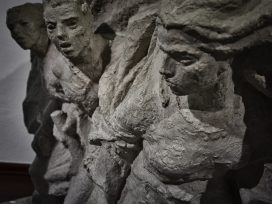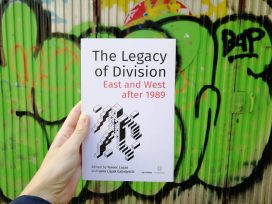May 2009. I’m about to leave for Vilnius. This year the Eurozine network meets in the Lithuanian capital.
But what do I know of Lithuania and its culture? Lithuania is one of the three Baltic republics; the birthplace of Simanas Daukantas, the well-known national historian who died in the mid-nineteenth century; home of the Bund, Zionism; site of the extermination of the Vilnius ghetto during WWII; and then there is Lithuanian, one of the most archaic and interesting Indo-European languages.
Rephrasing the definition that Chamberlain gave of Czechoslovakia after leaving it in the hands of Hitler, I must admit that for me Lithuania is a remote country. I know nothing about it.
My plane lands. I know I’m late for the Eurozine opening ceremony at the presidential palace with the president himself. I get off the plane in a rush, catch a taxi and try to convince the taxi driver that my destination is not the Italian Cultural Institute, where he wants to take me at all costs, but the presidential palace. He is sceptical, he insists but eventually gives up. It’s the rush hour, he says, it’s Friday night. I count the cars waiting at a red light: there are three. A few minutes and I am at the door which accesses the hall that welcomes the opening soiree… But what a traffic jam there is here! Security checks and metal detectors, your passport, ma’am, please. You are late… I know I’m late but let me in, please. I’m short of breath, I have to leave my luggage in a corner but someone has to tell me which one. And that is not an easy decision to make, it seems.
Finally, someone guides me through corridors and rooms. All very modern, a little cold, I would even say a little Soviet… I enter the hall while Antonin Liehm, the creator of the Lettre Internationale project, is at the end of his speech but I know what he thinks from having discussed the present and the future of the magazine with him so many times in the bistro Cent Kilos, two steps from his home in Paris. It is not by accident that Liehm has been invited this year to start off the Eurozine network meeting: it is twenty years since the fall of the Berlin Wall, and it is not by accident that the title of this 2009 meeting is European Histories. Liehm was one of the protagonists of the Prague Spring. He lived the history of it, the history of the liberation of the eastern half of Europe, and went through enthusiasm and disappointment like many eastern European intellectuals of his generation. And his disenchantment – as if history had finally taken a awry turn, as if all those battles fought for democracy had not been rewarded by a full, convincing, decisive victory – inevitably leaks out from the tone of his speech. And I’m sorry about that as you might expect. But I think about the title of this 2009 meeting, and think about the choice – most appropriate – that wanted a plural: European histories, and not European history. “Histories” means many things, but above all that the history written in western Europe does not necessarily coincide with the one the eastern Europeans are trying to write; that each single small story should somehow be represented in history, or at least be taken into account – for the ritual of memory is not in itself knowledge, and it is not enough to clean our consciences. Memory has often little to do with history and indeed sometimes it humiliates and betrays it by choosing – sometimes in good faith, sometimes not – what must be remembered and what can be forgotten, what is worth remembering and what should be forgotten. This is true individually and collectively. Hence, the need to rewrite histories – when documents require it, when time is ripe, when collective consciousness is able to bear a new reading of the facts or when it asks for it as an act of justice – to foster memory, renew it, correct it.
A sentence, among the many interventions, strikes me most: it is the one pronounced by Irena Veisaite, the Lithuanian Jewish writer and theatre critic born in Vilnius, who miraculously escaped deportation and massacre, her voice breaking the silence of the beautiful, panelled hall at the university: “You must understand one thing: in Lithuania, WWII ended in 1953.” And I wonder: what did the Berlin Wall come down for?
Lithuania entered the EU in 2004 together with Cyprus, Estonia, Latvia, Poland, the Czech Republic, Slovakia, Slovenia and Hungary. In 2007, the Union admitted Bulgaria and Romania, closing the circle formally opened by the fall of the Berlin Wall and subtracting definitively the countries of Central and Eastern Europe from the sphere of influence of the former-Soviet Russian empire. Lithuania entered the EU hopeful and proud to be admitted to the court of the democratic Europe after being tossed, contended, conquered, plundered and massacred for hundreds of years by its western and eastern neighbours. Vilnius bears the marks of an ancient grandeur. But its wounds are still open with only a thin patch to cover them: the facades of the houses are freshly painted, beautiful churches flaunt pastel colours that are too bright, the shops of international griffes are luxurious and empty. In the alleys, in the courtyards, clumps of weeds grow on piles of rubble.
Lithuania – and all the other countries of Central and Eastern Europe – now want justice; they want it from the Europe that democratically accepted them, because this act of adoption must not be a vacuous and formal attempt to export democracy and post-industrial capitalism to the East for the benefit of the West – but should be, for the East, a real opportunity to build strong and lasting democratic institutions.
This means that we, the networks of intellectuals in the West and East, still have much to do, and that over the next few years we have to rewrite the history of our continent. But it also means that the project of Lettre Internationale, stubbornly set out by Antonin Liehm twenty five years ago to break down the provincialism of the great European nations and to promote the understanding of the cultures of Eastern Europe in the western world, is still alive and well and, indeed, to it we must devote our care, our attention and our efforts – for Europe, but also against Europe, because we do not want it to remain the cathedral in which, as it preaches the good democratic principles, it pries into the financial affairs of the faithful. Twenty-five years ago, Liehm’s lesson taught us to treat in the same way any cultural difference, to recognize an “East” and “West” in every corner of the world; he taught us to understand that any clash of civilizations is in fact, as Edward Said used to say, a “clash of ignorances” that we must try to heal at all costs, to be brave “soldiers of culture”. There could not be – and cannot be – a clearer mission.
At Riga airport on my flight to Vilnius I exchange 50 euros into 172 Lithuanian litas. With it I pay two taxi rides, to and from Vilnius airport, two dinners, and a couple of pretty boxes of chocolate-covered marzipan. I remember that years ago, in the German town of Lubeck, Thomas Mann’s hometown, for two boxes of chocolates like this I paid ten times as much. If Lithuania had not entered the EU in 2004, before the outbreak of the global recession, it would never have entered it. The democratic, united Europe doesn’t like the poor.
No wonder that the homo europeus still fails to establish himself. To us, the Romanians, for instance, are still a spare European people – because the economy of their country is worth less than nothing and their history is of no interest to anyone.
There’s one thing I’m sure of: that’s an old story I’ve heard before.






